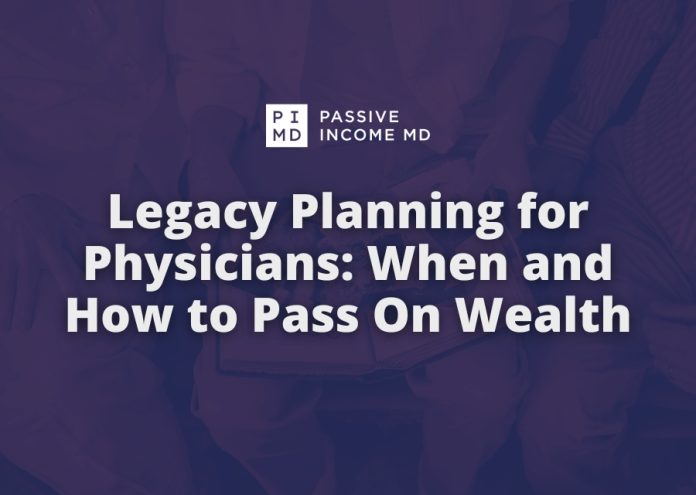As physicians, we dedicate our lives to caring for others – our patients, our colleagues, and especially our families. For years, I assumed that legacy planning for physicians simply meant passing on assets through a will or trust at the end of life.
But over time, I’ve come to realize that a true legacy isn’t about what you leave behind. It’s about how and when you support the people you love most.
And when it comes to legacy planning, timing is everything.
The Inheritance Dilemma: Too Late to Matter?
Let’s say you live a long, healthy life into your 80s or 90s. By the time your children inherit your estate, they’re likely in their 50s or 60s. Hopefully, if you’ve raised them well, they won’t need your money by then.
In fact, they may be telling you to enjoy it for yourself.
This is the classic dilemma of delayed inheritance. Traditional legacy planning for physicians often assumes money matters most at the end of life. But in reality, the most transformational opportunities often come much earlier, when your children are building their lives and navigating key decisions.
Why We Wait Too Long
Most people don’t delay giving because they’re selfish. They delay it because they’re afraid.
The biggest fear is running out of money.
This fear causes many to overwork during their prime, underspend in retirement, and hesitate to help others. It’s not about a lack of generosity. It’s about not being sure if they can afford to give.
In Die With Zero, author Bill Perkins notes that most people die at their peak net worth. Instead of using their wealth meaningfully, they stockpile it. And often, they miss the opportunity to make a difference while they’re still alive.
As physicians, we’re especially cautious. We’re trained to think ahead and plan for worst-case scenarios. But this mindset can also lead us to treat money as something to protect indefinitely, instead of something to use with intention.
A Better Approach: Intentional Giving While You’re Here
This is where legacy planning for physicians can take a more intentional, meaningful form.
What if we changed our mindset?
What if, instead of saving everything for a someday that may come too late, we gave strategically while we’re still here to offer wisdom, encouragement, and guidance?
This isn’t about handing over everything you’ve earned. It’s about recognizing the moments where your help could change someone’s future.
Here are three key times to consider giving:
1. When They’re Pursuing Education
Student debt can shape a person’s life. Our community knows what it’s like to carry a six-figure debt burden into our 30s. I also know from experience how long it takes to recover from six-figure loans.
Helping your children graduate without debt or less debt gives them options. It gives them freedom. It also creates a valuable opportunity to have conversations about the cost of education, return on investment, and smart money habits.
Being involved during this first major financial decision is one of the best ways to model financial wisdom and support their success.
2. When They’re Buying Their First Home
Real estate can be a powerful wealth-building tool, but it’s increasingly out of reach for many young adults.
Helping with a down payment, or even co-investing in a property, can create stability and momentum. It’s also a chance to teach them about real estate fundamentals, mortgage terms, cash flow, and smart investing.
If you already invest in real estate, this becomes a natural extension of your journey. And it’s a great way to pass along your knowledge in a real and impactful way.
3. When They’re Facing Life Transitions
Life brings turning points. Your children may face job changes, relocations, business ideas, health issues, or seasons of raising young kids.
These moments are when support matters most.
Some examples of impactful giving:
- Startup capital for a business
- Funding career coaching or education
- Helping with moving expenses or childcare
- Making it possible to take a more meaningful job, even if it pays less
Many of us stay in high-stress roles longer than we want because we feel we have to. What if your legacy could help your children choose purpose over pressure?
Ever feel torn between supporting your family and protecting your future?
I put together a FREE quick guide called “7 Smart Ways to Give to Your Family Without Risking Your Retirement.”
It’s a simple, practical read designed to help you build the legacy you want… without blowing up your financial freedom in the process.
How to Give Without Fear: Cash Flow Is the Key
So how do you give without putting your own retirement at risk?
The answer is consistent, reliable cash flow.
When your assets generate income through real estate, dividends, or business ownership, you’re no longer relying on savings alone. You’re living off returns. This allows you to be generous without fear.
You stop asking, “Can I afford to give?”
You start asking, “Where can I make the biggest difference?”
That’s why I’ve focused so much of my own strategy on real estate and business. Passive income gives you options. It provides peace of mind and the freedom to give when it matters most. This is a cornerstone of legacy planning for physicians, creating systems that support giving without sacrifice.
Planning for the Unexpected
We can’t predict the future. That’s why my wife and I created a family trust that does more than transfer assets. It reflects our values.
Instead of a lump sum, the trust distributes funds at specific moments – such as education, a first home, or starting a business. It’s a plan designed to provide both structure and flexibility.
We treat it like a financial care plan. It’s built with intention and designed to support, not just preserve, our family’s future.

Subscribe to receive the 7 Steps you can follow to achieve Financial Freedom
If financial freedom is your goal, there’s no better time to get started than right now.
Unlock actionable steps that you can take every day to fine-tune your goals, discover your interests, and avoid costly mistakes on your financial freedom journey.
Legacy Is Also About Mindset
Passing on wealth is important. But passing on wisdom is even more valuable.
Talk to your children about money. Let them see how you save, invest, give, and spend. Show them that money can be used to build a meaningful life, not just accumulate stuff.
Legacy planning for physicians should include education, mentorship, and modeling a life of purpose, not just numbers on a spreadsheet.
Final Thoughts
Most of us won’t die with too little. We’ll likely die with more than we need.
The real question is this: What could your money have done if you’d started giving earlier?
So take a look at your cash flow, your values, and your opportunities. Ask yourself where you can start giving today, while you’re still present to guide and support.
Because the best legacy isn’t something you leave behind. It’s something you build every day.
Were these helpful in any way? Make sure to sign up for the newsletter and join the Passive Income Docs Facebook Group for more physician-tailored content.
Peter Kim, MD is the founder of Passive Income MD, the creator of Passive Real Estate Academy, and offers weekly education through his Monday podcast, the Passive Income MD Podcast. Join our community at the Passive Income Doc Facebook Group.
Further Reading
Create your very own Auto Publish News/Blog Site and Earn Passive Income in Just 4 Easy Steps







